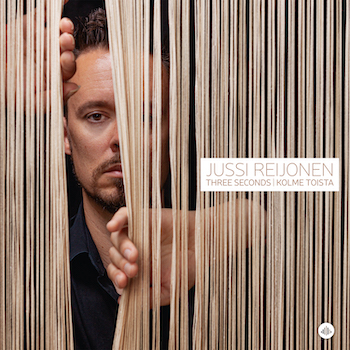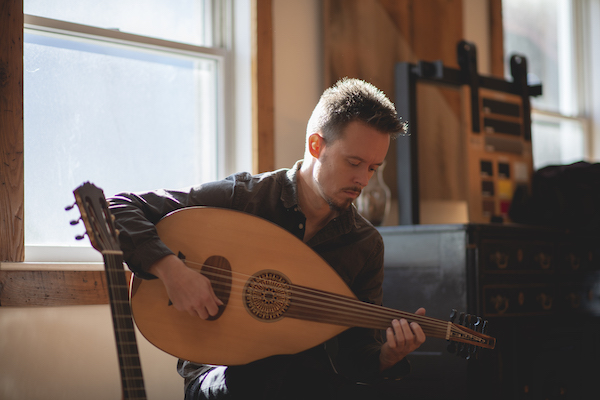Jazz Album Review: Jussi Reijonen’s “Three Seconds/ Kolme Toista” — “One Hell of a Journey”
By Michael Ullman
Jussi Reijonen, Three Seconds/ Kolme Toista (Challenge Records)
The music comes out of an extended personal crisis; the compositions found here are a testament to a musician regaining his voice.
 The cover of Jussi Reijonen’s new disc, Three Seconds/ Kolme Toista, shows the guitarist up close, separating a string shade with both hands. As he parts this veil (“behold, the veil of the temple was rent in twain”) he stares soberly into the camera and at us. It’s a sign of the seriousness of this piece, a five-movement suite written for a nonet. The composition signifies the end of what he tells us was a nine-year period in his life that he experienced as a blur. The music, therefore, comes out of an extended personal crisis; the compositions found here are a testament to a musician regaining his voice. The instrumentation is unique, and so is the background of the various musicians: Jason Palmer on trumpet and flugelhorn; Bulut Gülen on trombone; Layth Sidiq, violin; Naseem Alatrash, cello; Utar Artun, piano; Kyle Miles, bass; Keita Ogawa, percussion; and Vancil Cooper on drums. Reijonen plays guitars and oud. The musicians, he informs us, are from Jordan/Iraq, Palestine, Turkey, Japan, and the United States. He wrote his suite with each individual in mind, allowing each to express himself as part of the collective. Reijonen plays guitars and oud.
The cover of Jussi Reijonen’s new disc, Three Seconds/ Kolme Toista, shows the guitarist up close, separating a string shade with both hands. As he parts this veil (“behold, the veil of the temple was rent in twain”) he stares soberly into the camera and at us. It’s a sign of the seriousness of this piece, a five-movement suite written for a nonet. The composition signifies the end of what he tells us was a nine-year period in his life that he experienced as a blur. The music, therefore, comes out of an extended personal crisis; the compositions found here are a testament to a musician regaining his voice. The instrumentation is unique, and so is the background of the various musicians: Jason Palmer on trumpet and flugelhorn; Bulut Gülen on trombone; Layth Sidiq, violin; Naseem Alatrash, cello; Utar Artun, piano; Kyle Miles, bass; Keita Ogawa, percussion; and Vancil Cooper on drums. Reijonen plays guitars and oud. The musicians, he informs us, are from Jordan/Iraq, Palestine, Turkey, Japan, and the United States. He wrote his suite with each individual in mind, allowing each to express himself as part of the collective. Reijonen plays guitars and oud.
In his notes, Reijonen explains that he was born in Finnish Lapland, and brought up “in Amman, Dar es Salaam, Muscat and Beirut for a significant part of my childhood.” He is shaped “by the dynamic counterpoint between Finnish, Jordanian, Tanzanian, Omani, Lebanese, and American cultures.” It hasn’t been entirely comfortable. The new album comes after a tumultuous period in his private life during which he attempted to “pull apart” as he grappled with conflicting patterns in his life: one involved his personal multiculturalism, the other his family, “a family fractured in part by the personal, generational, and cultural dissonances between the threads that connect us.” He was caught in between and, if I read him correctly, felt fractured. He wasn’t able to make music. Oddly, the Covid era gave him an opportunity to retreat and reexamine the inhibiting pressures. “I suddenly saw in a new light old patterns whose familiar presences I realized I had felt for much of my life, but had until then never seen for what they were.” He started to compose again, or as he put it, “new music started to come.… And with the music came clarity.” He emerged from behind the veil and, to use his own metaphor, rewove his personality as he made this music, though which he discovered “a truer more complete reflection of where I come from, who I am, and maybe who I am still becoming.”
The suite begins with “The Veil.” Reijonen strums a chord on his guitar, which he lets hang in the air. There is a pause, and then the solo cello beautifully states the short melody that underlies the movement, and the suite. The brass, though with violin on top, takes up this melody. The percussionist then asserts himself with a thudding bass drum that continues throughout most of the piece. There are crashes, brief solos by the piano and violin, and scrambling ensemble passages. What is striking is the variety of textures Reijonen evokes and their quicksilver changes. The piece becomes increasingly dissonant, as if to suggest the clashes of life behind the veil, or the difficulty of emerging from it. At almost five minutes, much of the band drops out and we hear deep thumps from the percussion, followed by the brass playing long notes while the pianist states the now familiar melody and then solos. The movement ends peacefully with brass resolving the remaining tension. The fetching, memorable melody seems to win out.
“Transient” sounds exotic to this Westerner’s ears. It begins with an extended (for this session) solo on violin. The transience may refer to the composer’s childhood wanderings, or then again, his need to accept change. There’s a cleverly written segment for percussion with interjections of the same phrase by Reijnonen. Later the violin solos over percussion, made up of what sounds like tambourine, bass drum, and various hand drums. The percussionists dominate this movement, even after the cello and violin reenter, playing a written melody.

Jussi Reijonen performing on the oud. Photo: Luis Zavaleta
Next comes what I hear as the key movement of the suite. It bears a complicated title: “The Weaver, Every So Often Shifting Sands Beneath Her.” Weaving isn’t easy. It begins with Reijonen playing a simple repeated melody on electric guitar. The bass enters and supplies support. Then the melody is replayed with variations over long tones by trombone, flugelhorn, and violin. Even the pizzicato violin has a turn at that melody. A short trombone solo comes along over a newly dissonant background. There’s a stoppage around six minutes in. Jussi restarts the band. In the piece’s final minutes the drummer lets go before a quiet ending in which the flugelhorn is prominent.
“Verso” begins in a now familiar manner with a single strummed chord, a silence, and then the guitarist reenters and eventually introduces a quick, quietly dancing passage. Reijonen continues to play over the percussion … hand drums … and even solos modestly as the pattern is played pizzicato behind him. Then, at around two minutes, a kind of explosion occurs, a wildly dissonant passage on violin gives way to a sudden insistence — even what could be described as a kind of violence — as some of the band members improvise side by side. Eventually, trumpeter Jason Palmer enters into a kind of cross-cultural exchange with the violin: he sounds dashingly Western and the violin sounds otherwise. We hear, as it were, two cultures trading opinions on the composed melody. Another passage for percussion arrives, which gives way to a piano solo. On Three Seconds, no one solos for long, and these monologues do not take place in a vacuum. The group always surrounds and supports (and sometimes contradicts) the soloist. In “Verso” there’s a pause after the conflagration, followed by a chorale version of the original melody, as if all were resolved. The final voice is the violin playing its version of the melody.
The final movement, “Median,” begins with Palmer beautifully stating the melody on flugelhorn. He is then joined by trombone and the rest of the band. At times, the bowed cello and violin stand out over the band’s repetitions of the melody. A strange “rashing” sound from the percussion underlies much of this otherwise gentle movement: it sounds like someone is dropping a load of lumber in an echo chamber. Eventually the proceedings seem to almost dissolve, as a dazzling — or bedazzled — electronic drone continues over the tinkling of a piano restating the theme. The piece dissipates into tonelessness, or maybe timelessness.
After the recording session, trumpeter Palmer asserted flatly that “Jussi’s a genius.” The imaginative ways in which Reijonen manipulates the group’s textures are nothing if not distinctive: he integrates natural-sounding, carefully constructed written passages with evocative solos. The guitarist/composer confesses that he has documented “one hell of a journey.” He’s written one hell of a piece.
Michael Ullman studied classical clarinet and was educated at Harvard, the University of Chicago, and the U. of Michigan, from which he received a PhD in English. The author or co-author of two books on jazz, he has written on jazz and classical music for the Atlantic Monthly, New Republic, High Fidelity, Stereophile, Boston Phoenix, Boston Globe, and other venues. His articles on Dickens, Joyce, Kipling, and others have appeared in academic journals. For over 20 years, he has written a bi-monthly jazz column for Fanfare Magazine, for which he also reviews classical music. At Tufts University, he teaches mostly modernist writers in the English Department and jazz and blues history in the Music Department. He plays piano badly.
Tagged: Challenge Records, Jason Palmer, Jussi Reijonen, Michael Ullman
